Lea Wait's Blog, page 27
August 22, 2024
Hubris—it’s a terrible thing.
Just when you thought you knew everything… back to the research drawing board you go.
 I’m a big fan of research. Heck, I was student library president in high school. I have a degree in history, and I spent forty years in the law biz writing pleadings and briefs. If you need a factoid and it exists in the real world, I’ll find it. I am also available to track people, and pets… wait – that’s another blog
I’m a big fan of research. Heck, I was student library president in high school. I have a degree in history, and I spent forty years in the law biz writing pleadings and briefs. If you need a factoid and it exists in the real world, I’ll find it. I am also available to track people, and pets… wait – that’s another blog  . Last month, I wrote about the joy and familiarity of writing the fourth book in the Hayden Kent series. Hayden and I have been friends since 2012 when we met during NANOWRIMO. Because I created her, I thought I knew most everything about her. That would be boring. I’m glad she still has some surprises up her dive skin. It’s the surprises in her dive sites that confound me.
. Last month, I wrote about the joy and familiarity of writing the fourth book in the Hayden Kent series. Hayden and I have been friends since 2012 when we met during NANOWRIMO. Because I created her, I thought I knew most everything about her. That would be boring. I’m glad she still has some surprises up her dive skin. It’s the surprises in her dive sites that confound me.
I became a certified diver in 1971. It was easier then, lots of science, but less stuff to wear. Most of the “old” wrecks I write about were sunk to become artificial reefs after I certified. They were intact when I first dove them. Hurricane George broke the Eagle in two. Hurricane Dennis moved The Spiegel Grove from her starboard side to her keel. Death by Blue Water features a wreck called the Humbolt. She’s the fictitious stand in for the Thunderbolt. I last dove her in 2005, before Wilma, Irma, and Ian struck the middle Keys. I needed to know what she looks like today. She’s a featured player in my current work in process, Death by Deception.

Photo by Karl Callwood via Unsplash
The last time I dove her, several fire coral covered toilets littered her decks. How they got there confounds me. It’s eighty feet from the surface to the deck. I suspect nets and ropes were involved, but no one’s talking. Then there’s the fire coral. It’s yellow. Colors disappear at depth. Yellow is one of the first to go. Many an unsuspecting tourist diver posed on those potties, to the amusement of the locals. The wreck also boasted a full-size plastic skeleton in the wheelhouse that was regularly repositioned and replaced. The last time I saw him, he lounged in the corner on a toilet. Divers love a good joke. I wondered how the two goliath groupers that frequented the wreck felt about him.
Thunderbolt was sunk in 1986 as part of the artificial reef program, but finding it was never a straightforward task. You needed accurate GPS numbers and someone willing to dive to the submerged mooring barrel carrying a bowline with a spring hook. The fire coral encrusted barrel rested fifteen feet below the surface, so hooking up was a delicate venture. Things didn’t get easier after that. Fish hooks lost by anglers studded the descent line from the barrel to the wreck. The dive was worth the risk. That, as my husband likes to say, was then. This is now.
I’m living in Maine these days. No opportunity to hop off a boat and do a quick check dive on the ‘Bolt. Instead, I checked my facts the way any sensible writer would do. YouTube videos. Good thing I wasn’t underwater. My mouth hung open for most of the reel. Toilets – gone. Skeleton – gone. In 2023, a dive club undertook cleaning up the wreck. They hauled all that stuff to the surface. Even the mooring barrel was gone. Replaced with two mooring balls resting twenty feet down. It was a relief to see the two goliath groupers still in residence. Details matter in fiction. I have over a hundred dives on the Thunderbolt, but none of them are current. Without research, so many of these details would have disappeared, just like the yellow of fire coral.
I’m not a proponent of write what you know. I am a proponent of trust, then verify. Even if I’m double checking my own memories to bring them into the present day.
Writers, how do you research places you aren’t able to visit? Readers, do errors affect your enjoyment of a story?
Kait Carson writes the Hayden Kent Mysteries set in the Fabulous Florida Keys and is at work on a new mystery set in her adopted state of Maine. She is a former President of the Guppy Chapter of Sisters in Crime and a member of Sisters in Crime, Guppies, and Sisters in Crime New England. Visit her website at www.kaitcarson.com. While you’re there, sign up for her newsletter.
August 19, 2024
A look back at a Maine author summer
As summer winds to a close (not technically, but it feels like it, doesn’t it?) I can’t help but feel like it just barely started. Even with the climate crisis giving us shorter winters, the logistics of summer in Maine really haven’t changed. The seasonal businesses open up around Memorial Day or a little after. In June, the summer people start trickling in. Things ramp up after Fourth of July, then slow down two short months later, after Labor Day.
Before we know it, we’ll be pulling the mucklucks out of the drawer, putting the snow tires on the car and stocking up on soup.
Another thing that slows down once the weather gets cooler are author events [though there are still many great author events and appearances through the winter holidays!]. I get it — there are fewer people around and libraries and other organizations are reluctant to schedule something that the weather may cancel.
That all got me to thinking about the crazy variety of author events I’ve done so far this summer. From street craft fairs to an overnight stay on beautiful Vinalhaven to being the featured author at the Phillips Public Library’s big annual fundraiser — it’s been a author-licious summer. All of these wildly different events have in common one of the great things that makes living and writing in the great state of Maine such a treat — the support and enthusiasm of readers and people who love books. Librarians, friends of Maine’s awesome libraries, Mainers and summer visitors have all made it another summer to remember.
With that in mind, I thought I’d share some photos from this summer’s Maine author adventures.
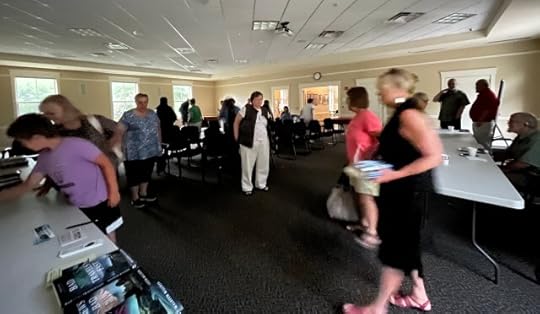
The lights went out during a tremendous thunderstorm during an early July panel in Topsham featuring me, Kate Flora, John Clark and Vaughn Hardacker. Being the troupers we are, we carried on as though nothing had happened until the librarian informed us and our awesome audience that fire regulations didn’t allow us to stay in a public building with no power. We had 10 minutes to get out (pictured above), but that didn’t stop some of our fans from taking the time to buy books. A big thank-you to Linda Meadows of the Topsham Public Library, the rest of the staff there and the library’s patrons for sticking with us and turning out in the first place.
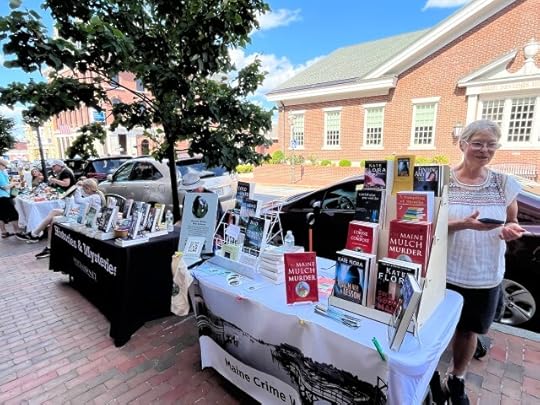
Kate Flora (above, in Bath), Matt Cost and I have been doing the monthly art walks in downtown Brunswick and Bath this year. This is an interesting experience because most people don’t expect to find books at an art walk [or craft fair] — or an art walk on a downtown street for that matter — and it involves a lot of conversations with a huge variety of people, some who are into books and some not so much. I like to think that every conversation, even with someone who marches up to announce “I don’t read books!” has some benefit. I’ve met many interesting people who’ve I’ve convinced to at least take a bookmark. Bringing Maine mysteries to the people!

The Vinalhaven Ferry
In July, the Friends of Vinalhaven Public Library hosted Kate Flora, Jule Selbo and me for an overnight combo cocktail reception and Making a Mystery panel [for a more detailed account, see Jule’s excellent post]. We were basically treated like rock stars. What a great time! A big thank-you to the library friends, the library staff and the people who came out on a hot and humid night to talk to us, take part in our panel and buy our books.
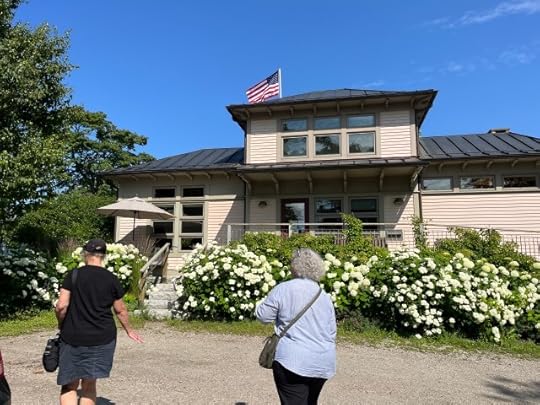
Kate and Jule approach the Vinalhaven Public Library before our big event.
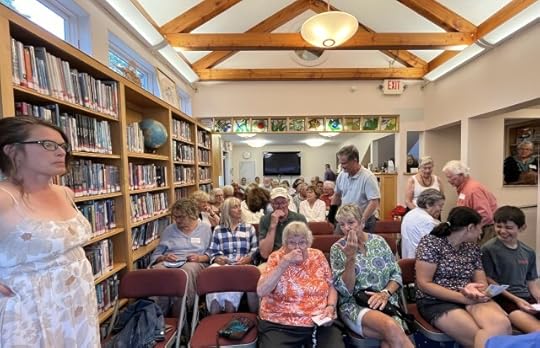
It was standing room only at the Vinalhaven Public Library to hear our Making a Mystery panel.
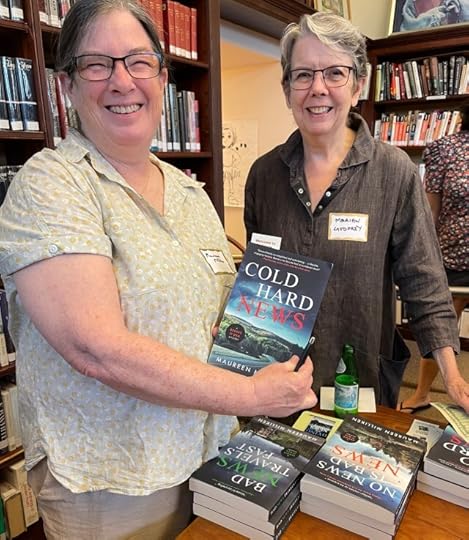
Vinalhaven readers were very supportive and generous – they bought many books!
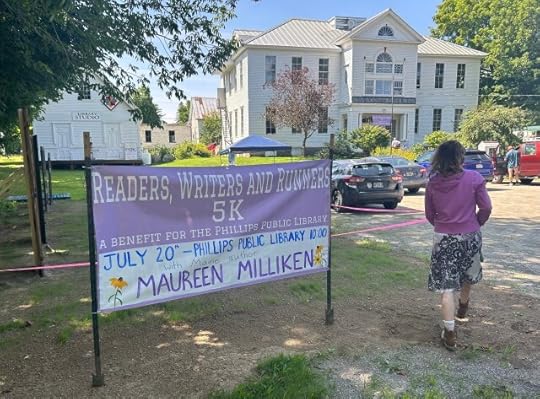
Shortly after the Vinalhaven experience, I was honored to be the guest author at the Phillips Public Library Readers, Writers and Runners 5K [no, I didn’t have to run!]. The event is the library’s big fundraiser of the year and features a 5K, a potluck lunch and an author talk. As an added treat, it’s in Franklin County, in western Maine, right near where my fictional town of Redimere is. A huge thank-you to Phillips library Anna Plog, her awesome staff and the wonderful people who attended to hear me talk and also support their library.
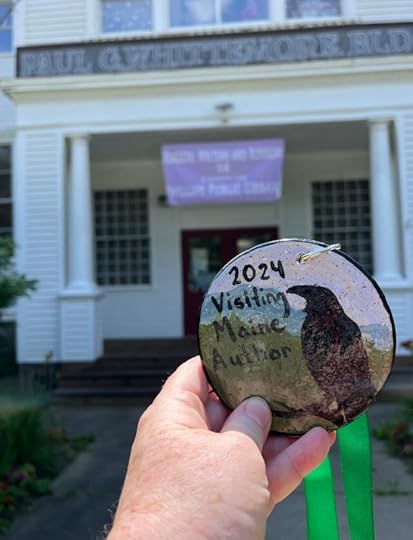
In Phillips, I was given a cool medal designed by a local artist and based on my author logo (designed by my sister Rebecca). The winning runners in the 5K also got medals with the same design. How cool is that?
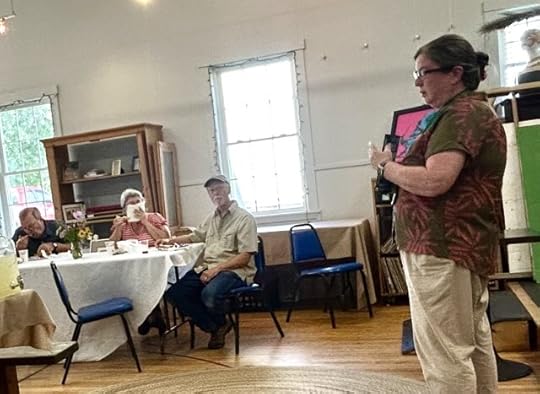
I talked while those attending the Phillips event ate the pot luck lunch (delicious!), which I thought was great. I feel people are much more inclined to listen to a talk if they have the soothing addition of good food. As you may have noticed, I’m wearing my medal!
Summer certainly isn’t over, and there are more events to come, including the Maine Bookfest in Waterville this weekend, where I’m sharing a table on Saturday and Sunday with Kate Flora. I have some other things going on, including traveling to Presque Isle in December for the Central Aroostook Chamber of Commerce annual holiday craft fair. I love meeting people all over the great state of Maine. I can’t wait for the next event. If you’re looking for something to do, consider attending a local author event and supporting Maine writers, as well as libraries, chambers of commerce, nonprofits and other institutions that host the events we appear at.
August 16, 2024
Weekend Update: August 17-18, 2024
 Next week at Maine Crime Writers there will be posts by Maureen Milliken (Monday), Sandra Neily (Tuesday), Kait Carson (Thursday) and Dick Cass (Friday).
Next week at Maine Crime Writers there will be posts by Maureen Milliken (Monday), Sandra Neily (Tuesday), Kait Carson (Thursday) and Dick Cass (Friday).
In the news department, here’s what’s happening with some of us who blog regularly at Maine Crime Writers:
Matt Cost will be doing a book signing today (Saturday) from 1-3 p.m. at Shermans Maine Coast Book Shop in Windham. On Sunday, he will be doing a signing at Books-a-Million (BAM) from 1-3 p.m.
Adventures of Writers on Writing (A-WOW)
Matt Cost will moderate a panel of writers including Kate Flora, BJ Magnani, Jule Selbo, and Joseph Souza at the Topsham Public Library on Tuesday, 8/20/24, from 6:00 to 7:30 p.m. The topic will be adventures in the writing process with an emphasis on some of the more outlandish quirks and occurrences. Writing a novel starts with an idea, the inspiration that germinates and grows into a book. This is followed by research, writing, editing, marketing, and promoting. These Lit Legends will discuss their processes along the way to the birth of a book. The audience will be included in trying to determine which writer was involved in what unorthodox and ridiculous practice in their writing or interaction with the world in the creation of their book. Questions and interaction from the audience are strongly encouraged.
An invitation to readers of this blog: Do you have news relating to Maine, Crime, or Writing? We’d love to hear from you. Just comment below to share.
And a reminder: If your library, school, or organization is looking for a speaker, we are often available to talk about the writing process, research, where we get our ideas, and other mysteries of the business, along with the very popular “Making a Mystery” with audience participation, and “Casting Call: How We Staff Our Mysteries.” We also do programs on Zoom. Contact Kate Flora
Permission to Devote Your Life to Storytelling
Kate Flora: It will happen sometimes. I’ll be reading a book and suddenly a single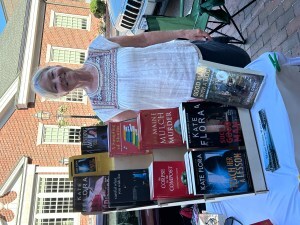 sentence or two will leap out at me and stop me in my tracks. Sometimes it’s an insight into character that gives me ideas for my work in progress. Sometimes a description. Sometimes it will be something that is true for me as a writer in a way that I never thought about before. A few days ago, in a book called The Book of Dreams by Nina George, an editor is thinking about her local cafe, where she sometimes meets with aspiring authors, and she thinks this:
sentence or two will leap out at me and stop me in my tracks. Sometimes it’s an insight into character that gives me ideas for my work in progress. Sometimes a description. Sometimes it will be something that is true for me as a writer in a way that I never thought about before. A few days ago, in a book called The Book of Dreams by Nina George, an editor is thinking about her local cafe, where she sometimes meets with aspiring authors, and she thinks this:
Those writers would describe their imaginary worlds to me, each hoping I would publish their manuscript and turn them into an author so that they might devote their lives to storytelling
We don’t talk about it enough, I think, that we are storytellers. Sometimes the magic of storytelling, of using our imaginations to create entire worlds we can invite readers into, gets lost in the mix of marketing, the ‘buy my book’ dance, anxiety over whether an editor will buy our book, buy our next book, whether we will have a good idea for the next book, and all the myriad things that surround the actual process of creation.
I’m still struck by an experience I had years ago, which I described in an earlier blog this way:
[image error]A few years ago, at one of those A-list parties where I was surrounded by some of those “famous” authors whose books are on all our shelves, I was working on an assignment to write a column for a magazine. The topic was “IMAGINATION,” so I asked several of the authors what came to mind when I said “imagination.” You’d think I’d said a dirty word. Some were silent. Some pondered as though I’d asked a trick question. A few offered uncertain answers, suggesting the realm of fancy and fantasy, or something dark or New Age. Not one responded as I’d expected, shrugging their shoulders and stating the obvious. “Imagination? Heck, we’re writers. Imagination is our principal tool.”
But the issue here is giving yourself permission to be a storyteller. What it feels like to set aside all of the other chores a writer had and become immersed in story. Allowing your imagination to soar so that you’re in that rare zone where story flows and your characters are real and you feel the sunshine of your face if it’s daytime in the story or sense the darkness and danger of being in the woods at night when there are bad people there too.
It’s kind of a special mindset, learning to identify oneself as a writer. I had probably published three books before I stopped filling the occupation blank on forms with lawyer and started writing author or writer instead. Until then, I hadn’t felt entitled to do that. Most of us suffer from some form of imposter syndrome, where we feel as though we’ve mistakenly been published, seen as an author, even read as an author. That sense that one day soon, someone will come along and burst the bubble. We’ll be revealed as the frauds we are.
 Which gives rise to the question: why can’t we just enjoy this magical ability we have to create worlds and blow life into characters, and describe imaginary places that feel so real our readers can imagine being there. Characters so real our readers know them. Dialogue that sounds like the way real people talk. Why do we let so much other “stuff” get in the way of the pure joy of creation. Of achieving what, for many of us, what a life long dream–to be a writer.
Which gives rise to the question: why can’t we just enjoy this magical ability we have to create worlds and blow life into characters, and describe imaginary places that feel so real our readers can imagine being there. Characters so real our readers know them. Dialogue that sounds like the way real people talk. Why do we let so much other “stuff” get in the way of the pure joy of creation. Of achieving what, for many of us, what a life long dream–to be a writer.
So this week, as long as I can hold the rest of the “stuff” at bay, I am going to enjoy being a storyteller. I am going to finish the Joe Burgess book I’ve been working on for months and let myself get deeply immersed on those tense, climactic scenes. I am going to smile when I at last type “The End” of latest endeavor as a storyteller, and hope that those I end up telling the story to will feel some of the enchantment.
(author’s note: the photos aren’t on topic except me doing my “buy my book” dance. Otherwise, they’re some of the magic of my world outside the writing process)
August 14, 2024
Update on the Face Downs
 Kaitlyn Dunnett/Kathy Lynn Emerson here, today writing as Kathy. Face Down Under the Wych Elm released a week ago, meaning the first five books in the Face Down series are now available in newly edited, print-on-demand, trade paperback editions. The other five are edited, proofread, and scheduled to come out one each month from September through January. For those of you who read my last blog, I freely admit there may be typos I missed, most of them probably inserted when I was making a change to the earlier text or correcting an older typo. The nice thing about Indy publishing is that corrections really can be made as needed, so feel free to let me know if you spot anything in any of the versions I’ve revised and reissued during the last couple of years.
Kaitlyn Dunnett/Kathy Lynn Emerson here, today writing as Kathy. Face Down Under the Wych Elm released a week ago, meaning the first five books in the Face Down series are now available in newly edited, print-on-demand, trade paperback editions. The other five are edited, proofread, and scheduled to come out one each month from September through January. For those of you who read my last blog, I freely admit there may be typos I missed, most of them probably inserted when I was making a change to the earlier text or correcting an older typo. The nice thing about Indy publishing is that corrections really can be made as needed, so feel free to let me know if you spot anything in any of the versions I’ve revised and reissued during the last couple of years.
So what’s next? I’m glad you asked. The original plan was to go back to turning my paranormal historical romance, Firebrand, originally written in a rush in just three months and published in the 1990s, into a more cohesive novel retitled Treacherous Visions. I’ll still do that, and publish it in both e-book and trade paperback, but it occurred me me after editing Face Down #10 (Face Down O’er the Border) that I really should do a print-on-demand trade paperback edition of the Face Down short stories. They’ve been collected before, in the three-volume e-book omnibus editions of the Face Down novels (now updated to agree with the text in the new paperbacks) but there is no single e-book or book version that contains all seventeen of them. Several of them weren’t even imagined, let alone written when Murders and other Confusions, my first short story collection, was published by Crippen & Landru.
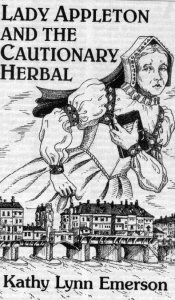
original artwork for Alfred Hitchcock Mystery Magazine
So, on tap after a breather is editing and proofing what will be titled Lady Appleton’s World: The Complete Short Stories. I envision a February 2025 release date.
What do I plan when all ten Face Down novels and the short stories are available? Promotion for the “collector’s set” was the initial goal. Perhaps a special offer if purchased directly from the author. I doubt I’ll be doing signings or panels, even if I have a new knee by then, but I’ll do more than usual online. Since I’m not dependent on book sales to keep a roof over my head, and there’s no publisher breathing down my neck about self-promotion, I’m free to do as much or as little as I like. Thank goodness!
I may just keep on doing what I’ve discovered I really enjoy doing—revising and reissuing backlist titles. You see, the rights for two more of my sixteenth-century mysteries are due to revert to me within the next year, and another two will follow after that. And those, like the short story collection, can be reissued in both e-book and paperback formats because there won’t be any older versions out there to confuse the issue.
And after that? I’m sure I’ll think of something. I may not be writing any new fiction, but I’m far from ready to retire completely.

Kathy Lynn Emerson/Kaitlyn Dunnett has had sixty-four books traditionally published and has self published others. She won the Agatha Award and was an Anthony and Macavity finalist for best mystery nonfiction of 2008 for How to Write Killer Historical Mysteries and was an Agatha Award finalist in 2015 in the best mystery short story category. In 2023 she won the Lea Wait Award for “excellence and achievement” from the Maine Writers and Publishers Alliance. She was the Malice Domestic Guest of Honor in 2014. She is currently working on creating new omnibus e-book editions of her backlist titles. Her website is www.KathyLynnEmerson.com.
The Second-Book Shudder
Our guest today is Shelley Burbank, whose second Portland-based P.I. book, Night Moves, debuts today.
Shelley Burbank: I refuse to call it a slump.
With my second mystery novel about to launch and an odd heaviness settling over my mood, I realize the disturbing ennui that sometimes overtakes second-year college students has struck. My emotions this week border on, dare I say it?
Dread.
It’s a mild dread. Nothing too serious, but pernicious. A weak but notable anxiety, like the hour before an exam for which you’ve studied but, gosh, you never know if you might have missed that one section of the reading the professor chooses to emphasize.
And okay, fine, some nausea. But that could be all the coffee.
When I search “sophomore slump” online, hundreds of articles and blog posts shuffle down my computer screen like a dusty window blind. I skim and gape. The contents read like a horror story.
Failure to live up to standards. Frustration. Boredom. Lack of motivation. Loss of momentum. Existential dread.
Is this me?
I pat myself down like a triage nurse looking for signs of injury. I’m okay. I’m okay. I repeat the words like a mantra, and no gaping wounds appear. I’m okay.
I’m not as okay as last year.
Last year I was a freshman novelist. When my first Olivia Lively mystery, FINAL DRAFT, launched, I felt excited and hopeful. Not quite cotton candy fluff, but close. My attitude tended toward cheerful and energetic. I jumped into my life as a published novelist, grinning, throwing launch parties, gushing on social media, and exuding manifest positivity. Life was good. My dreams of publication had been realized. People will read my book, I thought. Maybe not a ton of people, but some! How marvelous!
I didn’t consider myself totally naive. Although I was a debut novelist, I thought I knew the score. I’d spent years in the apprenticeship trenches learning all I could, not only about the writing craft but also the industry. I firmly told my husband, “Don’t expect me to become famous or make a ton of money. It just doesn’t happen.” He said he got it. “And I’ll have to hustle, you know, to make sales.” He said he heard me loud and clear.
Going into a contract with a small press, I knew I’d be taking on the bulk of marketing responsibility for the book. I knew sales would be counted in the hundreds, not thousands. I knew publication wouldn’t change my life or anything. I considered myself prepared.
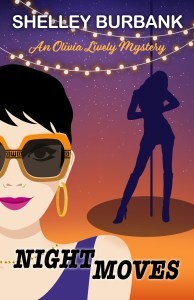 As predicted, my first book launched and sales were what I and my publisher expected. While I’d hoped for even more, of course, the numbers themselves didn’t faze me. It was a start. I was pleased by reader response. People liked—some even loved—my first book. They shared it with their friends and bought it as birthday presents for family members. Ratings on Amazon and Goodreads were above average. Reviews were positive.
As predicted, my first book launched and sales were what I and my publisher expected. While I’d hoped for even more, of course, the numbers themselves didn’t faze me. It was a start. I was pleased by reader response. People liked—some even loved—my first book. They shared it with their friends and bought it as birthday presents for family members. Ratings on Amazon and Goodreads were above average. Reviews were positive.
I saw the first book as a platform on which to build.
Once FINAL DRAFT launched, I had this idea to write prequel novella to use as a lead magnet. Before long, I realized it was actually book two in the series and expanded my original plot. On advice from an experienced and excellent Maine Crime Writer, I made it a murder mystery.
I set the story once again in Portland, but I also sent my main character, female private investigator Olivia Lively, to a cozy cabin in the north woods. Think loons and kayaks and crows in the pine trees. The smell of lakewater and smoke from mesquite grills. A dead body. I then spirited Liv back to Portland for art galleries, restaurants, and runs along the Eastern Prom and Back Cove. I threw in a secret erotic novel, a seedy stripclub, possible Russian mafia dudes, boyfriend troubles, and a goofy Labradoodle to lighten things up.
Writing this book was fun.
Now NIGHT MOVES: An Olivia Lively Mystery is ready to launch into the world, and I’m feeling oddly panicked. Last year’s cheerful optimism has faded into a miasma of doubt. Uncertainty spirals like fog from a Maine lake on a chilly morning.
I love my book. I did the best I could. What if it’s not enough?
It’s the second-book shudder. I know more now than I did last year. The realities of the publishing industry–specifically marketing–bum me out. I wonder, can I do better this time? What if I do worse? Is there really anything I can do about it? Because standing out in a super-crowded market kind of seems impossible even if you spend a big chunk of time and energy and money promoting yourself and your work.
Marketing is a beast devouring my writing time and joy. I picture it with sharp spines, slavering mouth, and a bloated, ravenous belly dragging on the ground.
I grapple with the marketing monster on a daily basis. I wave my sword. I identify and resolve tech issues. I post several times a day on social media in hopes of reaching new readers. I then read that social media doesn’t work anymore to reach new readers. I see a billion ads that tell me all I need to do is take “this awesome Masterclass” to learn how to use social media to reach readers. I pivot from one email marketing software (EMS) to another. I spend hours in webinars. I read books and articles and blog posts on marketing. I join groups to learn more about growing a reader base. I buy a domain email that, sigh, doesn’t “authenticate” with the new EMS. I end up on yet another platform using my old free gmail.
All this to sell a few hundred books? When I think about it, my heart stutters.
“But, Shelley,” you say. “This is just business. It’s part of the writer life. Grow up.”
It is. I know it. I know I’m being a sophomoric crybaby.
Something about this imminent second book launch has panic gathering inside me like a thunderstorm, all dark purple clouds and flashes of distant lightning. As launch approaches, I start to wonder, what’s all this hustling for? What’s so great about being a published author? Could I simply write for myself and leave marketing behind forever? Would I be happier?
I love writing. Conjuring a story onto paper that was once just a glimmer in my head gives me all the feels. I get huge joy from sharing those stories with others, and that’s what hooks me. In order to share, I need to market. In order to market, I need to chill out.
After a few days of this existential dread, I go in search of help.
I send a “save me!” text to my cohort in Las Vegas, and she listens and offers some perspective, asking, “What’s the worst thing that could happen?”
I realize that the worst thing would be nobody buys my book and I’ll have spent a year of my life on a failed project. I will have embarrassed myself–and probably my relatives, too. They’ll pretend not to know me if they run into me at Devaney, Doak, and Garrett where I’ll be staring mournfully at the Maine author shelves while my lucky writer’s shirt falls to shreds around me like Miss Havisham’s dress.
I’m kidding. I don’t have a lucky writer shirt.
However bleak this scenario, my life wouldn’t end. I’d still have a home and food and coffee and books to read. I’d still have a lovely husband and friends. I’d still be living in two beautiful places, Maine and San Diego, and experiencing all there is to love about these locales.
I realize I could shut down my social media and website tomorrow, abandon the internet completely, throw away my email list, and still manage to live a good, meaningful life full of reading, writing for fun, knitting, and making lots of soup.
But I’m not ready to give up. Harnessing the power of Google search, I seek out some Stoic principles that actually help with the imposter syndrome I’m experiencing. I’m reminded that I can only control my thoughts and decisions and actions, not external events.
I learn that hope and despair are dual and connected. Failure and success are dual and connected. Everything is itself and its opposite. Trippy.
I learn the key to life is progress, not perfection. If I work hard, write as well as I’m able, learn from my mistakes, and take reasonable steps to market my books, the rest is out of my control.
The panic subsides, and I feel better. It’s just a sophomore shudder, I realize. Nothing terminal. I’ll live to write another day. But maybe I should get a lucky shirt just in case?
____________________
Night Moves: An Olivia Lively Mystery
Encircle Publications, August 14, 2024
After a splashy success with her last big case, Olivia Lively, P.I. is struggling to manage Lively Investigations’s sudden—and exciting—growth spurt. When an old friend offers her a chunk of cash to investigate his wife and brother who may be having an affair, Liv reluctantly agrees. She heads to a cozy cabin in the Maine woods to investigate, thinking it will be a chance to enjoy summer while also solving her cash flow problem. When the suburban wife turns up dead, Liv discovers a possible connection to a seedy strip club and the Russian mob. It’s a sticky summer in Portland, Maine, and in the heat of it all, Liv discovers that often the most complex relationship a woman has is the one with herself.
____________________
Shelley Burbank is a mystery and women’s fiction author and journalist based in Maine and San Diego, California. She’s a contributing writer to the Waterboro Reporter newspaper, and her short fiction has been published nationally in True Story, True Love, and True Confessions magazines. Regional and literary publications include San Diego Woman Magazine and The Maine Review. Final Draft, the first Olivia Lively Mystery published by Encircle Publications (March 2023), was her debut novel. The second in the romantic mystery series, Night Moves, will be released on August 14, 2024. For the latest news, find Shelley on Facebook and Instagram, and visit http://www.shelleyburbank.com.
August 13, 2024
The Exorcism of Hinkee Joubler
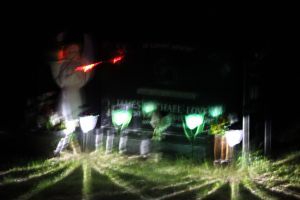
John Clark: hoping to replicate an exorcism that worked some twenty years ago. In that instance, I had a recurring dream that I had murdered a young woman while still drinking and after getting sober, kept waiting for the police to nab me. The story In Your Dreams was published in an early Level Best Books anthology. I made $25 and never had the dream again.
In 1970, after graduating from college, I was granted conscientious objector status by my draft board and was thus required to do two years of alternate civilian service. My choices were work at the Augusta State Hospital, or the Bangor State Hospital. Augusta was closer to Union where I grew up, so I chose to work at what soon became AMHI. Since I wasn’t allowed to live in my home town, I got a free room (bed, bureau, and high walls with no ceiling) on the third floor of the old chapel.
I was hired as a basic psychiatric aide at a weekly salary of $86.50 and assigned to the 4-12 shift on the Harlow Building. My first night on duty, while awaiting being scheduled for basic aide training, my supervisor, handed me the keys to the medication cabinet and said, “I’m off to dinner, have fun.” Having zilch for experience and training, I was justly apprehensive. That feeling was reinforced when an hour later, I had to escort an older man who was in the manic phase of his bi-polar illness, to a seclusion room and lock the door once he was inside.
That should have been a heads-up, but I was a bit slow on the uptake and my two year commitment stretched for twenty-seven years. During that time period, I got married, got sober, earned two masters degrees (adult education and library science), and had experiences that rival things you’ve read in fantasy and horror stories.
In hindsight, I should have found a different job in state service early on after fulfilling my commitment, but that didn’t happen. Let it be said that state (probably local and federal) jobs come attached with varied levels of dysfunction. I believe your average dairy farmer could govern or legislate as well as most folks who get elected. The Peter Principle certainly runs riot in state government.
Here are some of the experiences that I suspect contribute to the dream I can’t get rid of (specifics about that later). When I was promoted to assistant team leader on the 3-11 shift, my current girlfriend who also worked at AMHI and I took a van load of patients to a hockey game at Colby College. When we were getting ready to leave the arena, one of them bolted out the door. We searched, but couldn’t find him, so we went to the police station and reported what had happened.
What followed was painful and stressful. He was found dead in a cornfield three days later and my girlfriend and I were treated as though we had completely neglected our responsibility since we were dating.
You’d think that would be enough trauma for a job, but wait, there’s more! One inescapable fact of working in mental health is that patients kill themselves (some staff, too, but that’s another matter). There’s no way you don’t make connections with certain patients. That’s simple human nature. One young woman who had made a serious suicide attempt stabilized, but we knew it was just a matter of time before she succeeded. She did so by cutting her throat with a butcher knife. Another man who I became friends with, was unable to work through guilt over how he’d treated his family. A year after being released, he walked into a river and drowned. Another young woman who I befriended went to a private psychiatric facility in another state. She mailed me a post card telling me that life looked much better and she now had a boyfriend. The day I received the card, she shot herself.
One woman who I didn’t know jumped off the big bridge before the suicide fence was erected. She did so in November, but her body wasn’t found until March. When we tried to put her on a morgue slab, we had to jump up and down while pushing on her knees to get her legs straight enough to slide the metal tray into the opening.
My next experience was right out of a Twilight Zone episode. We had reorganized AMHI into geographic units and I was the evening team leader for one that served Androscoggin, Oxford, and Franklin Counties. As part of our planning for community re-entry, we had an internal halfway house on the top floor of the building adjacent to where we treated patients. One evening, I went over to administer medications and found one of the male patients hanging from a light fixture.
Help arrived quickly, but it was too late, so the physician on duty ordered us to put the deceased in a body bag and take him to the morgue. No sooner had we done so than he realized we needed to involve the medical examiner. The good doctor had me retrieve the body, dress him and then re-hang his corpse. Once the medical examiner arrived and did his job, I had to re-do everything. Once I returned from the morgue, the physician threw up his hands and said, “I can’t deal with any more right now. You call his wife and tell her.” I did and it was probably the most painful and awkward phone conversation I’ve ever had.
If traumatic experiences had been confined to interactions with patients, it would have been bad enough, but places rife with pathology attract pathological people as employees. When I got sober in October of 1980, that changed the dynamics between me and those who supervised me. The two who were above me in the supervisory chain were pieces of work. My direct supervisor was the activities director. She had been divorced by an alcoholic husband and had a level of hatred for men in general that was scary. My being in recovery pushed plenty of buttons. It got so bad that every time I went on vacation, I knew when I returned that something unpleasant would happen, like work hour changes, losing staff, or extra duties without any logic.
Her boss was more subtle, but had a problem with prescription medications that also left her feeling threatened by my recovery. In addition, some of the people running the department of mental health were sicker than the patients. When I volunteered to be an affirmative action trainer, I was informed by the airhead from central office that I could no longer tell jokes because it would tarnish my credibility as a trainer. You can guess where that went.
Plenty more strange events happened in my twenty-seven years at AMHI, but I’ve given you an insight into why I might have disturbing dreams. Oddly enough, the one I have at least once a week is about my still working there even though I haven’t received a paycheck for five years. Nobody appearing in my dream seems to find that odd except me. Hopefully, this blog post will banish that semi-nightmare. Stay tuned to find out.

August 11, 2024
Elderly Banking and The Wonders of Autopay!

Vaughn C. Hardacker
Vaughn C. Hardacker here: Recently, my (Former)bank decided to close the local branch. Normally, this would not have been a big deal because I did 95% of my banking by ATM. You can imagine my anger when they said the ATM was going to be removed also. This meant that any time I wanted to visit the ATM, I would have to drive to the branch in Presque Isle (40 miles drive each way). I decided to close my account and move to another banking institution.I also use Autopsy for all my recurring bills, including phone, credit cards, and mortgage. If there is such a place as Hell, it’s where banks get together to design ways to ensure you don’t change banks. The result was several late payments and hours on the phone trying to get a human being to help me. The entire process was beyond rediculous and made me recall a post I did over two years ago. I wish I had been able to find the name of the woman in that blog–it would have made everything so much easier!
Elderly BankingOriginally posted on May 17, 2022 by VHave you ever had to contact your bank? What a pain in the keester! However, I plan on hiring the author of the letter below to deal with mine from now on!Shown below, is an actual letter that was sent to a bank by an 82-year-old woman. The bank manager thought it amusing enough to have it published in the New York Times
Dear Sir:
I am writing to thank you for bouncing my check with which I endeavored to pay my plumber last month. By my calculations, three nanoseconds must have elapsed between his presenting the check and the arrival in my account of the funds needed to honor it. I refer, of course, to the automatic monthly deposit of my entire pension, an arrangement which, I admit, has been in place for only eight years. You are to be commended for seizing that brief window of opportunity, and also for debiting my account $30 by way of penalty for the inconvenience caused to your bank. My thankfulness springs from the manner in which this incident has caused me to rethink my errant financial ways. I noticed that whereas I personally answer your telephone calls and letters, — when I try to contact you, I am confronted by the impersonal, overcharging, pre-recorded, faceless entity which your bank has become. From now on, I, like you, choose only to deal with a flesh-and-blood person.
My mortgage and loan repayments will therefore and hereafter no longer be automatic, but will arrive at your bank, by check, addressed personally and confidentially to an employee at your bank whom you must nominate. Be aware that it is an OFFENSE under the Postal Act for any other person to open such an envelope.
Please find attached an Application Contract which I require your chosen employee to complete. I am sorry it runs to eight pages, but in order that I know as much about him or her as your bank knows about me, there is no alternative. Please note that all copies of his or her medical history must be countersigned by a Notary Public, and the mandatory details of his/her financial situation (income, debts, assets, and liabilities) must be accompanied by documented proof.
In due course, at MY convenience, I will issue your employee with a PIN number which he/she must quote in dealings with me. I regret that it cannot be shorter than 28 digits but, again, I have modeled it on the number of button presses required of me to access my account balance on your phone bank service. As they say, imitation is the sincerest form of flattery.
Let me level the playing field even further. When you call me, press buttons as follows: IMMEDIATELY AFTER DIALING, PRESS THE STAR (*) BUTTON FOR ENGLISH
#1. To make an appointment to see me.
#2. To query a missing payment.
#3. To transfer the call to my living room in case I am there.
#4. To transfer the call to my bedroom in case I am sleeping.
#5. To transfer the call to my toilet in case I am attending to nature.
#6. To transfer the call to my mobile phone if I am not at home.
#7. To leave a message on my computer, a password to access my computer is required. Password will be communicated to you at a later date to that Authorized Contract mentioned earlier.
#8. To return to the main menu and to listen to options 1 through 7 again
#9. To make a general complaint or inquiry. The contact will then be put on hold, pending the attention of my automated answering service.
#10. This is a second reminder to press * for English. While this may, on occasion, involve a lengthy wait, uplifting music will play for the duration of the call.


Your Humble Client
Regrettably, but again following your example, I must also levy an establishment fee to cover the setting up of this new arrangement. May I wish you a happy, if ever so slightly less prosperous New Year?
Your Humble Client
And remember: Don’t make old people mad. We don’t like being old in the first place, so it doesn’t take much to piss us off. . .
Author note: I have tried to get her name and contact information, but the bank said they can’t release it due to privacy constraints! Riiiight!
August 9, 2024
Weekend Update: August 10-11, 2024
 Next week at Maine Crime Writers there will be posts by Vaughn Hardacker (Monday), John Clark (Tuesday), Kaitlyn Dunnett/Kathy Lynn Emerson (Thursday) and Kate Flora (Friday), with a special guest post from Shelley Burbank on Wednesday.
Next week at Maine Crime Writers there will be posts by Vaughn Hardacker (Monday), John Clark (Tuesday), Kaitlyn Dunnett/Kathy Lynn Emerson (Thursday) and Kate Flora (Friday), with a special guest post from Shelley Burbank on Wednesday.
In the news department, here’s what’s happening with some of us who blog regularly at Maine Crime Writers:
Matt Cost will be signing books at Shermans Maine Coast Book Shop in Boothbay Harbor on Saturday, 8/10, from 1-3 p.m. On Wednesday, 8/14, he will be doing a COST TALK at the Readfield Community Library at 6 p.m. On Friday, 8/16, Cost will be signing books at the Bath Art Hop along with fellow Maine Crime Writers Kate Flora and Maureen Milliken. And on Saturday, 8/17, Cost will be signing books at the Shermans Maine Coast Book Shop in Windham from 1-3 p.m.
An invitation to readers of this blog: Do you have news relating to Maine, Crime, or Writing? We’d love to hear from you. Just comment below to share.
And a reminder: If your library, school, or organization is looking for a speaker, we are often available to talk about the writing process, research, where we get our ideas, and other mysteries of the business, along with the very popular “Making a Mystery” with audience participation, and “Casting Call: How We Staff Our Mysteries.” We also do programs on Zoom. Contact Kate Flora
The Challenges of Writing a Compelling Ending
Have you ever arrived at the end of your novel and realized it just didn’t work? Or that you had no idea how to end it? Or who did the crime and why they did it? If the answer to these questions is yes then don’t feel like you’re alone. All of us writers feel this way at one point or another.
Writing a compelling ending is hard work. It requires a lot of thought and contemplation. You have to be adaptable and willing to look at your story from different angles. How many times have we read a great novel, often one by a big name author, and been sorely disappointed by the ending? It’s almost as if they got tired of their story and just stopped. As writers, we definitely don’t want to leave our hard-earned readers on a sour note.
If writing endings were easy, everyone would be a writer. At times, I wish being a writer was like being a starting major league pitcher. You pitch the first eight innings of the game and then have a closer come in to finish the ninth for you. But alas, if you want to be an author, writing a satisfying ending is something we must learn to do.
Using another sports analogy; the best defense is often a good offense. And by this I mean that half the battle in composing a great ending is writing a great story. Making the reader care how your story ends means you’ve done a successful job holding their interest. Now you need to smoothly land this jet plane that is your plot and make sure your passengers get to their gates. You’ll need to provide an ending that will give closure and allow the reader to walk away satisfied.
The type of book you’re writing can often determine the type of ending you’re shooting for. A police procedural or cozy mystery requires that the ending be neatly wrapped up. Domestic thrillers, which I write, often have ambiguous endings, leaving the reader wondering what just happened. A great example of this is Gillian Flynn’s GONE GIRL. After all the horrendous things Nick’s wife has put him through during the course of the novel, Nick realizes at the end that he can’t just up and leave her. Amy’s gotten herself pregnant, and Nick is terrified that his child will be raised by this evil woman.
Many readers were angry that Flynn ended her novel this way. Others loved this ambiguous ending. It left the reader contemplating about will happen next in their relationship. It’s the same reaction many viewers had when watching the last episode of The Sopranos. Tony and his family are sitting in the booth of a diner. Mysterious people walk in and out. There’s something tense and scary about this scene. We wonder what’s going to happen. Will Tony and his family get killed? Then the screen goes black and that’s the end of the show. Some people loved this ending while others despised it and felt they’d been cheated for all the time and effort they put in watching the series.
The show, Breaking Bad, on the other hand, has a well defined plot arc that resembles a rainbow; at the end is a pot of gold. The writers wrapped up the show and left no question about Walt’s fate. Each show ended differently, for entirely different reasons, and each ended in interesting fashion. The ending fit the story line.
Not to get metaphysical, but what actually is an ending? If you ask yourself this question, I believe it will make writing your endings that much easier. Or at least less harder. Because, when one thinks about it, an ending is merely the beginning of something else. Consider what will happen to your surviving characters after your book ends. If it’s a series, the conclusion will impact how your characters act and think in the next book.
The most important aspect of your ending is this: how will the main characters change or be changed by the events that happened in your plot. Sometimes a violent, action-packed ending is not what’s needed. Sometimes, it’s how your character has changed that leaves the reader emotionally impacted. As in GONE GIRL, Nick is left reeling because he will have to live with his evil wife for the foreseeable future. This type of profound ending hits like a sledgehammer and keeps the reader thinking about your story long after it’s finished.
Lay the groundwork for your ending by writing a killer plot. A strong storyline will do much of the heavy lifting when it comes to crafting the conclusion. Spend time thinking about how to close out your novel even while you’re writing it. Sometimes it helps to write out a few different scenarios before you find the one that fits best. Often, it will take a few rewrites to get it just right. Then, if you’re like me, you’ll listen to your agent and editor, both of whom will give you additional input as to bring your storyline together.
Don’t get discouraged. Endings are tough. Persevere and work your way through them. And with that, I wish you the best writing that killer ending.

Lea Wait's Blog
- Lea Wait's profile
- 506 followers



